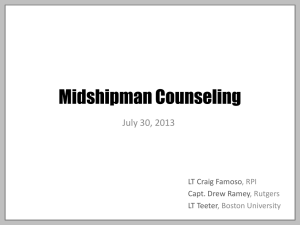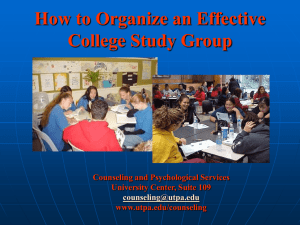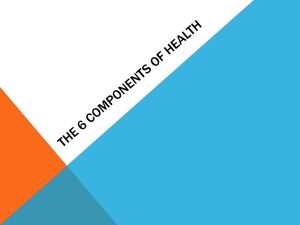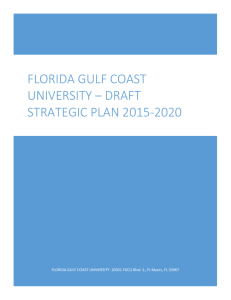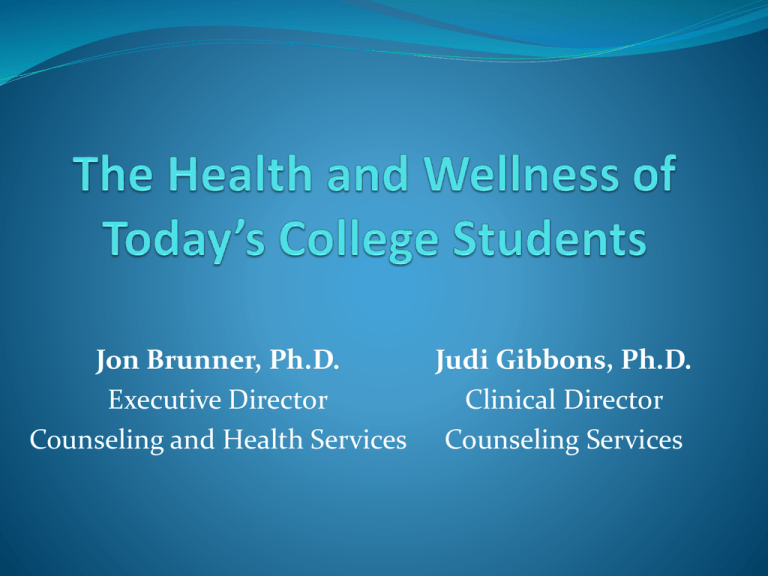
Jon Brunner, Ph.D.
Executive Director
Counseling and Health Services
Judi Gibbons, Ph.D.
Clinical Director
Counseling Services
FGCU Health and Wellness Services
• Prevention & Wellness Services (health education)
• Student Health Clinic
• Counseling Center (CAPS)
• Testing Center
• Adaptive Services for Students with Disabilities
Millennial Students: The Good, the Bad, and the Ugly
(Born between 1982 through to today)
They tend to:
• be the most protected and supervised generation and have lived
•
•
•
•
•
sheltered & structured lives.
have passionate and nurturing parents and were raised to see
themselves as being special (emphasis on self esteem)
be more inclusive and tolerant of religions, ethnicity and sexual
orientations (they are the most ethnically diverse generation)
be conventional, rule oriented and accepting of authority (tend to be
followers and conformists)
acknowledge and respect positions, titles, and rules (but frequently
challenge).
be technologically savvy (self-taught through experimenting and
exploring)
Millennial Students: The Good, the Bad, and the Ugly
(Born between 1982 through to today)
They tend to:
•
•
•
•
•
•
•
•
communicate electronically; they live, learn, and relate through
technology (new tribalism)
multi-task well
not learn from failure
have exposure to vast information but go less in-depth.
be as intent on their education as their parents (they have been pushed
by adults to study hard and to succeed)
be interdependent on friends, family, teachers, role models
value their interpersonal relationships highly and success in these
relationships is primary (high value on peer bonding)
be the most stressed and anxious generation ever
Tough Times for Some Students
Consider the titles of popular books about college
students:
When Fear and Hope Collide
College of the Overwhelmed
Generation on a Tightrope
The Data is In!!
• CORE Survey
• National College Health Assessment II
• The Association for University and College
Counseling Center Director & National
Counseling Center Directors Surveys of 2011
Counseling Center Director Surveys
of 2011
• Average mental health staff to students was 1:1879
• Over a third of counseling centers reported having a waiting
list
• 91% reported they believed that the trend of students with
severe psychological problems continues to be true on
campuses
• 40% of the clients treated had severe psychological problems
Counseling Center Director
Surveys of 2011
Survey Highlights
•
•
•
•
The average number of students seeking services was 11% with the
percentage going down as the size of the institution goes up.
25% of counseling center student clients were taking psychotropic
medications
16% of clients have suicidal thoughts/behaviors (.6% died from suicide)
Frequency of presenting concerns:
Anxiety-41%
Drug abuse-8%
Depression-37%
Self Injury-9%
Relationships-35%
Eating Disorders-7%
ADHD/LD-15.6%
Sexual Assault-7%
Alcohol Abuse-11%
The NCHA II Survey - Fall 2011
National Results (FGCU Results)
• 81% felt exhausted (not from physical activity) (82%)
• 74% of students found some aspect of their life being
traumatic/very difficult to handle (79%)
44% reported Academics (53%)
35% reported Finances (41%)
31% reported Intimate relationships (36%)
28% reported Family problems (33%)
25% reported Sleep difficulties (30%)
The NCHA II Survey - Fall 2011
National Results (FGCU Results)
• 50% felt overwhelming anxiety (52%)
• 45% felt hopeless once during the year (49%)
• 36% felt overwhelming anger (41%)
• 30% reported being “so depressed that it was difficult to
function” (32%)
• 7% seriously considered suicide (6%)
• 5% intentionally injured themselves (6%)
What gets in the way of college
student success?
The NCHA II Survey - Fall 2011
National Results (FGCU Results)
Top Impediments to Academic Performance
• Stress- 29% (32%)
• Anxiety- 20% (23%)
Sleep Difficulties- 20% (25%)
Cold/Sore Throat- 15% (20%)
• Work- 13% (17%)
Concern Family or Friend- 11% (14%)
• Relationship Difficulty- 10% (13%)
Depression- 12% (12%)
• Internet/ Games- 12% (12%)
Extracurricular Activities- 10% (7%)
ADHD- 5% (6% )
What about Relationships & Sex
National Results (FGCU Results)
Violence & Abusive Relationships:
• 18% reported receiving a verbal threat (24%)
• 10% reported an emotionally abusive intimate relationship (14%)
• 9% reported unwanted sexual activity (10%)
• Overall one in four college women still report being a victim of
unwanted sexual activity
Sexual Behavior:
• 68% had a sexual partner in the last 12 months (73%)
Confirming Study
Birth Cohort Increases in Psychopathology Among
Young Americans, 1938-2007:
A Cross-temporal Meta-analysis of the MMPI
An article written by Twenge, J. M., Gentile, B.,
DeWall, C. N., Ma, D., Lacefield, K., & Schurtz, D. R.
and published in Clinical Psychology Review,
30, 145-154 (2010).
(Is psychopathology rising in emerging adults?)
In plain language:
• more students are characterized by unrealistically
•
•
•
•
•
positive self-appraisal, overactivity, and low self-control.
more students feel isolated and misunderstood.
more students may be described as sensitive and
sentimental.
more students are narcissistic, self-centered
general symptoms of anxiety are on the rise.
more students are predicted to experience moodiness,
sadness, restlessness, worry, dissatisfaction, and
instability.
What explains this data?
The extrinsic versus intrinsic model -- linear increase in
MMPI scores…each successive generation showed an increase.
This suggests that a shift in American culture toward
materialism, individualism, striving for status, unrealistic
expectations, and unstable relationships may account for the
increase in psychopathology in young people.
“At the very least, college campuses now have a larger percentage
of students with more serious mental health problems”
College Students Drink !!
(they also use pot………..)
FGCU CORE Survey Comparison
Reference
Group
2004
2008
Consumed
alcohol in past
year
81%
83%
81%
77%
82%
Consumed
alcohol in past
30 days
69%
64%
64%
58%
69%
Under age
consumed in
past 30 days
65%
54%
50%
49%
66%
Binge drinking
in previous 2
weeks
38%
37%
38%
35%
43%
3.2
4
3.8
2.6
4.6
18%
27%
26%
21%
29%
Average # drinks
a week
Driven Under
the influence
2010
2012
FGCU CORE Survey Comparison
• The Core Alcohol and Drug Survey was developed to measure alcohol and other drug usage, attitudes, and
perceptions among college students at two and four-year institutions.
• Development of this survey was funded by the U.S. Department of Education.
• The survey includes several types of items about drugs and alcohol.
• One type deals with the students' attitudes, perceptions, and opinions about alcohol and other drugs,
and the other deals with the students' own use and consequences of use.
• There are also several items on students‘ demographic and background characteristics as well as perception of
campus climate issues and policy.
2008
2010
2012
Reference
Group
Used Marijuana in past year
31%
36%
30%
31%
Used Marijuana in past 30 days
18%
14%
18.4%
18.1%
Used illegal drug other than
Marijuana in past year
16%
14%
12.5%
12%
Used illegal drug other than
Marijuana in past 30 days
5%
6%
5.3%
6%
The NCHA II Survey - Fall 2011
National College Health Assessment
Substance Used
(within last 30 days)
Actual Use
Perceived Use
Alcohol
62% (59%)
94% (96%)
Marijuana
14% (16%)
79% (89%)
All Other Drugs
13% (14%)
75% (86%)
National Results (FGCU Results)
Student Perceptions of Alcohol Use
• 18% makes me sexier
• 18% makes men sexier
• 27% makes women sexier
• 42% makes it easier to deal with stress
• 50% facilitates female bonding
• 52% facilitates sexual opportunities
• 59% facilitates male bonding
Student Perceptions of Alcohol Use
• 61% facilitates a connection with peers
• 63% allows people to have more fun
• 68% gives people something to talk about
• 74% gives people something to do
• 74 % enhances social activity
• 75% breaks the Ice
Every year over
1,100 college students die!!
From suicide:
Second leading cause of death among students
One study found that if you separate accidents from
alcohol related deaths…………..it is # 1
Rate of suicide is 7.5/100,000
The reason we do suicide awareness and intervention
programs for the university community
Student Health Services (SHS)
Location: Wellness Center
SHS is nationally accredited by AAAHC
Hours: **8:15 am – 4:45 pm Mon.-Thurs
**9:00 am-4:45 pm Fri
**Hours subject to change per semester
Phone: 590-7966
Service is provided appointment only except in emergencies
Health Center Services
• All Services Are Confidential
• SHS Uses Electronic Health Records
• Provides Routine Medical Care
• General Physicals
• Women’s Health
• Vaccinations
• Birth Control/ Limited Medications
• Sexually Transmitted Infection Testing
• After Hours Medical Advice Phone Service
• Supplies e.g. (bandages, crutches,condoms)
Top Two Diagnostic Reasons
Students Seek Health Services
• Upper Respiratory Infection
• Contraceptive Management
Student Health Services
Staff and Insurance
• Staffed by:
Medical Doctors
Nurse Practitioners
Registered Nurses
• Students under age 18, need parental consent to be treated.
(forms available)
• Student Health Insurance is voluntary through Gallagher
Koster Health Plans (available for the year or by semester)
not required to receive services at SHS
The Student Health Center
A busy place!
• Over 14,309 student visits in 2012 (recommend
appointments*)
o
o
9570 Female
3749 Male
• Over 45% of the student population visit the health center
in a year
• For over 77.5% of students the health center is their usual
source of care and/or primary care provider while enrolled
at FGCU**
*Stats for Health Fee
**Data Source ACHA Fall 2012 survey results N=405
The Student Health Center
A busy place!
• One student sample indicated that over 20% of FGCU
students do not have health insurance
• 95% were satisfied that their confidentiality and privacy
were carefully protected when they visit the health center**
• 85.4% students report being satisfied with there visit to the
center**
*Stats for Health Fee
**Data Source ACHA Fall 2012 survey results N=40
Tips for Parents
• If your student is sick, tell them to go to the health center
first (its free, accessible and a good first response).
• If they are told to take pain relievers, drink fluids, and get
plenty of rest, please encourage them to follow.
Tips for Parents
• Remind them about after hours medical advice phone
service.
• There will be cost recovery charges for labs and
medications.
• Ask them if they are keeping up with sleep and dietary
needs (FYI - nutritionist services are available at no cost).
Prevention and Wellness (PWS)
Location: Wellness Center
Hours: **9:00am – 5:00pm Mon – Friday
**Hours subject to change per semester
Phone: 590-7733
Students can walk in to speak with our staff, pick up some free
information, ask about resources, inquire about a program or check
on upcoming events.
Visitors are always welcome!
Prevention and Wellness Services
(PWS)
• Health Education Programming
• Alcohol and Drug Education
• Peers C.A.R.E (Wellness Peer Education group)
• Programming and Guest Speaker Services
Work with Housing, Greeks, Athletics, Student Groups, etc.
• Prevention outreach (Gazebo, Cash Cab, Prize Patrol, etc.)
• Social Norms campaign
• MyStudentBody.com (online for all students and parents)
Prevention and Wellness Programs
Total number of programs=333 Participants=11,967
MSB Accounts Created=2647
• Cookies, Coke and Conversation series (7 week series for
•
•
•
•
•
freshmen, SV)
Cash Cab (like the TV show, but with wellness questions)
Social Hosting/Alcohol Bystander Workshop (Student
Organizations/Greeks)
Tackling Mount Stressmore (stress management)
Sexual Jeopardy (sexual health)
College Chef (nutrition)
Prevention and Wellness Programs
Total number of programs=333 Participants=11,967
MSB Accounts Created=2647
• Party Smart (alcohol)
• This is Why I’m Hot (body image)
• New Kids on the Block—Is this real life? (diversity)
• Don’t’ be a Zombie (sleep tips)
• Relationship Red Flag (abusive relationships/dating
violence)
• Eagles Aware (suicide prevention)
MyStudentBody.com
Requirement for incoming freshman under 21
This flyer is in each parent and student bag.
Essentials Course of MSB contains three modules: Alcohol, Drugs and Sexual Violence.
Takes 1-3 hours to complete. 70% passing is required.
Please encourage your student to complete this task ASAP to avoid delays with their
course registration. Your student will be getting emails (Eagle Mail) with information and
instructions. They can also visit the website listed in the flyer.
Students who pass by August 31st are entered to win a FREE iPAD!
MSB or similar programs are a requirement of in-coming freshman at many institutions
around the country. Becoming a best-practice in prevention.
There is a Student Center tab that includes other wellness info for students, such as
nutrition and stress.
PARENTS! MSB has stuff for you too! Go to https://www.MyStudentBody.com and use
school code “eaglesparent” for articles and tips to help parents talk to their students
about difficult topics.
Counseling and Psychological
Services (CAPS)
CAPS is Nationally Accredited by IACS
Located: Second Floor Howard Hall, Suite 228
Hours 8:00 – 6:00 Mon.-Thurs.
8:00 - 5:00 Friday
Phone: 590-7950
Provides 24 hour Emergency Services
CAPS Services
• Personal Counseling & Therapy
• Group Counseling & Therapy
• Career Counseling
• Psychiatric Services
• Consultation
• Referral
• Case Management
• Outreach Programs
• Assessment Services (neuropsych testing for LD/ADHD)
• After Hours and Emergency On-call (24/7 availability)
http://studentservices.fgcu.edu/Counseling/
(mental health screening and other electronic resources)
CAPS Visits
Sessions Attended
Unique Users
2007
3499
657
2008
4620
765
2009
5150
827
2010
6674
1007
2011
8091
1120
2012
8434
1206
CAPS Visits
High Student Satisfaction Ratings from 2006-2011 - for
example…
Over 95% agree that they were comfortable using CAPS
services, would use them again and would refer others to
CAPS
64% agree that counseling made them better able to focus on
academic and study requirements
62% report that counseling made it possible for them to
continue as a student.
Top 6 Reasons Students Come to CAPS
(2008-2012)
Anxiety
65%
Stress
53%
Depression
46%
Self Esteem Issues
24%
Family Concerns
24%
Relationship Concerns
23%
When should I be concerned about my
student’s mental and emotional health?
• Social Withdrawal
• Marked change in appearance, self care, hygiene
• Excessive self criticism
• Tearful calls outnumber the others
• Talk of hopelessness
When should I be concerned about my
student’s mental and emotional health?
• Loss of motivation
• Excessive fatigue or lethargic mood
• Extreme increases in energy, rapid speech and thoughts
• Inability to think and concentrate, dramatic change in
grades
• References to self harm or suicide
Parent Tips
(developing the supportive partnership)
If your student has had psychological issues that required
counseling/therapy and/or psychiatric medication, refer them to CAPS
from the start.
Find out if going to college is fulfilling their goals. Are they happy? (monitor
don’t over react).
Ask about what they are discovering in terms of a career (it is OK to change).
Ask about how their relationships are going.
Ask them how they are eating and sleeping (seriously!).
Parent Tips
(developing the supportive partnership)
Ask about the pressure and stress they are feeling. Try to help them see
through it and be supportive.
Suggest they go to the CAPS website and take whatever screening they
think is relevant to how they feel.
Normalize the idea of seeking help let them know it is not a sign of
weakness
Suggest they go see a counselor or therapist in CAPS. They can come just
once to consult with a CAPS professional to see what we think or might
suggest.
Tell them you understand college students drink, but that you would hope
that it does not interfere in their academic or social life or put them or
their friends at risk (explain what you mean).
Remember the Developmental Issues
For Parents:
1. Competence = trusting your student
2. Redefining yourself = role change from caretaker to mentor
3. Separation = mange your anxiety
4. Intimacy = staying close without being over involved
For Students:
1. Achieving confidence and identity
2. Separation and independence
3. Managing emotions and achieving intimacy
WELCOME
to
Florida Gulf Coast University





